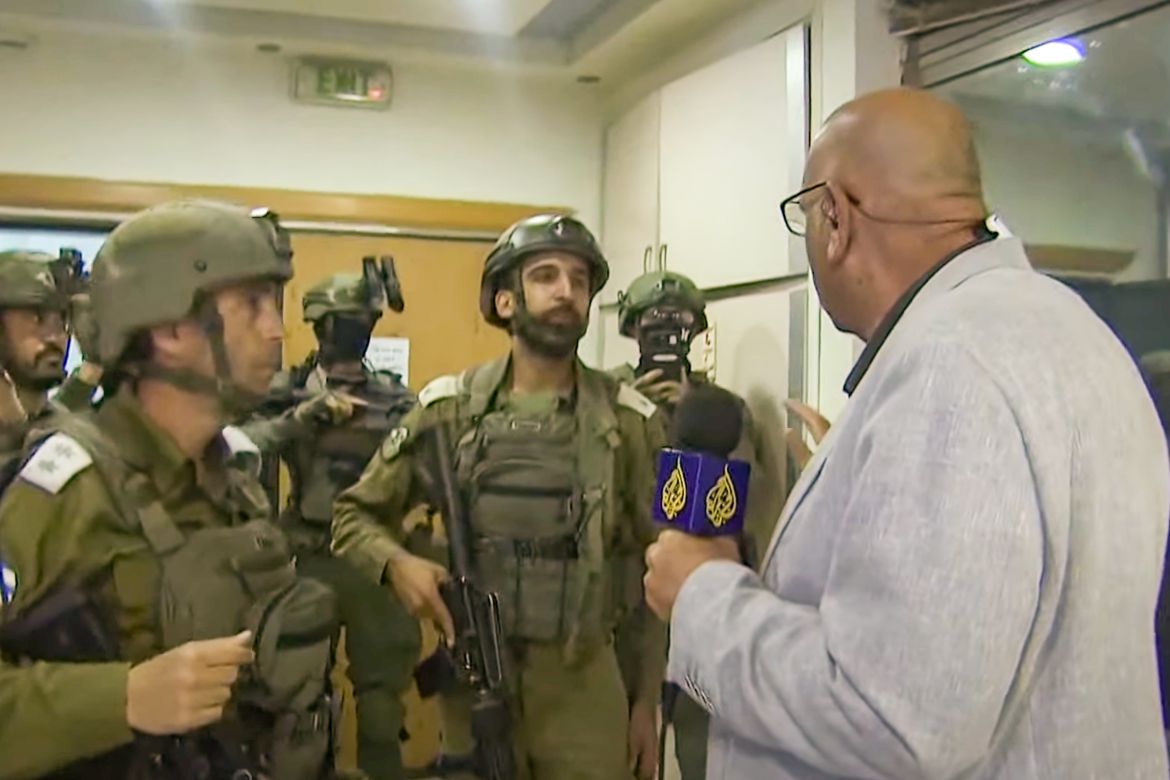- Israeli forces raided Al Jazeera's West Bank office in Ramallah and issued a 45-day closure order, citing incitement and support for terrorism (Cnn.com).
- Al Jazeera condemned the raid as an attack on press freedom and rejected the accusations as unfounded (Theguardian.com).
- Israeli Communications Minister accused Al Jazeera of being a "mouthpiece" for Hamas and Hezbollah (Politico.eu).
- The Foreign Press Association expressed concern over the raid, calling it a threat to press freedom (Nytimes.com).
- The Israeli military confiscated Al Jazeera’s equipment during the raid, sealing the office with iron doors (Aljazeera.com).
From the Israeli government's viewpoint, the raid on Al Jazeera's office is a necessary measure to combat incitement and terrorism. Israeli authorities accuse the Qatari-backed news network of being a mouthpiece for Hamas and Hezbollah, arguing that their coverage has contributed to anti-Israeli sentiment and violence. The closure of the office is framed as a vital action to protect national security, soldiers, and citizens, justified by intelligence assessments that link the broadcaster to terrorist activities.
Al Jazeera and international press freedom advocates view the raid as a direct assault on journalism and free speech. Al Jazeera rejects the Israeli government's accusations as unfounded and sees the move as an attempt to silence critical reporting on Israel’s military actions in Gaza and the West Bank. Press freedom organizations express concern that Israel is suppressing independent journalism to prevent global exposure of its actions, calling the raid a significant violation of democratic values.
From a Palestinian perspective, the raid is interpreted as another example of Israel's broader efforts to stifle Palestinian voices and suppress international coverage of the occupation. Al Jazeera's extensive reporting on the Palestinian experience of the occupation and the Gaza conflict is seen as critical in highlighting Israeli actions, and its closure is perceived as part of a long-standing policy to prevent transparency and accountability regarding the treatment of Palestinians.
Details
Security
Bias
Deltas
Israeli forces conducted a raid on Al Jazeera's office in Ramallah, located in the West Bank, and ordered its closure for 45 days. The operation took place early in the morning, with heavily armed Israeli soldiers entering the office and instructing staff members to leave within 10 minutes, taking only their personal belongings. According to reports from CNN and The New York Times, Al Jazeera broadcast live footage of the raid, capturing Israeli soldiers reading out the closure order and confiscating equipment, such as cameras and computers. The Israeli military justified the raid by stating that Al Jazeera was allegedly inciting terrorism and supporting terrorist activities, accusations that Al Jazeera has firmly rejected, describing them as "unfounded" and a violation of press freedom.
As The Guardian reported, the raid comes amid heightened tensions in the region, with ongoing conflict between Israel and Hamas in Gaza. Al Jazeera, a Qatari-funded network, has been one of the few international broadcasters providing continuous coverage of Israel's military operations in Gaza and the West Bank. The network expressed concern that the raid was an attempt to prevent them from reporting on the realities of the situation, especially in occupied Palestinian territories. Their office in Jerusalem had already been shut down earlier in the year, with the Israeli government passing a law that allows for the closure of foreign media deemed to be a threat to national security. Al Jazeera’s operations have been the subject of previous criticism from Israeli officials, who have labeled the network as a “mouthpiece” for Hamas and Hezbollah, as noted by Politico.
During the raid, Al Jazeera’s bureau chief in the West Bank, Walid al-Omari, was handed the military order, and his team was quickly evacuated from the building. According to Al Jazeera, the office was sealed off with large metal plates welded over the entrance, rendering it inaccessible to journalists. The Israeli military also confiscated additional office materials, including CCTV cameras and communication devices. Al Jazeera journalists reported being threatened with weapons during the raid, preventing them from covering the event in real-time. Several other media outlets, including The Wall Street Journal and Reuters, confirmed that no journalists were physically harmed during the operation.
The raid has drawn strong reactions from press freedom advocates around the world. The Foreign Press Association (FPA), representing international media in Israel and the Palestinian territories, expressed deep concern over the raid, calling it a significant escalation in restricting press freedom, as reported by The New York Times. The Palestinian Journalists’ Syndicate also condemned the Israeli actions, calling them an attempt to silence reporting on the occupation and the war in Gaza. Al Jazeera has vowed to continue its journalistic mission and to challenge the closure through legal means, despite the complex nature of the Israeli military court system, which often operates on the basis of “secret evidence” and administrative detentions, according to Al Jazeera.
In the broader context, this raid on Al Jazeera’s office is part of a continuing trend of Israeli actions against foreign media that it perceives as hostile or a threat to national security. Earlier in the year, Israel revoked the press credentials of Al Jazeera reporters in Israel and has restricted the ability of international journalists to enter Gaza, except on Israeli-organized trips. As The Guardian highlights, this latest move against the network has raised significant alarm about the erosion of press freedoms in the region, as many fear it sets a dangerous precedent for the treatment of journalists in conflict zones. Israel has maintained that these actions are necessary for national security, while press organizations argue that they hinder transparency and accountability for military operations in the occupied territories.
Security Risk Assessment
The Israeli raid on Al Jazeera's office in Ramallah presents a number of security risks and repercussions for the United States, particularly in terms of international relations, public safety, and potential escalation in Middle Eastern conflict zones. The event has already drawn significant international attention, with CNN reporting on the potential restriction of press freedoms, which could lead to increased tensions between Israel and its allies, including the U.S. The action could further inflame anti-Western sentiments across the region, particularly in countries that view the U.S. as a key supporter of Israel.
Potential Repercussions
1. **Increased Terrorist Activity**: The event may catalyze responses from militant groups such as Hamas or Hezbollah, both of which have a presence in the region. As Politico points out, Israel has accused Al Jazeera of inciting terrorism, a claim that may provoke a counter-narrative from these groups, resulting in heightened calls for retaliatory attacks against Israeli and U.S. interests.
2. **Destabilization in the Middle East**: As Al Jazeera details, this incident occurs in a highly volatile region. The closure of a major media outlet like Al Jazeera, which provides extensive coverage on the Israeli-Palestinian conflict, could increase regional instability, particularly as it escalates into broader geopolitical tensions. This instability could lead to greater violence in neighboring areas like Lebanon and Syria, where U.S. personnel are stationed.
3. **Threats to U.S. Diplomatic Facilities and Personnel**: Given the U.S.'s close association with Israel, American diplomatic facilities and personnel in the region could be targeted in retaliation, especially as anti-Western sentiment could be fueled by perceptions that the U.S. condones Israel's actions. According to TV Zvezda, the Israeli military’s aggressive actions, including the destruction of equipment, could be seen as a signal of broader repression, which may stir unrest.
Security Measures to Consider
1. **Increased Diplomatic Engagement**: To mitigate the risk of escalating violence, the U.S. should consider increasing diplomatic engagement with key players in the region, including Israel, the Palestinian Authority, and Qatar (which funds Al Jazeera). Ensuring that U.S. interests are protected while promoting press freedoms may ease tensions. Additionally, the U.S. could leverage its position to mediate a resolution to this particular issue, which could help stabilize the region.
2. **Heightened Security for U.S. Facilities**: Given the potential for retaliatory actions, U.S. diplomatic and military facilities in the Middle East should increase their security protocols. This includes reinforcing physical security measures, enhancing intelligence-gathering capabilities, and preparing rapid-response teams in the event of an attack. Coordination with local authorities is also critical to ensure the safety of personnel and assets.
3. **Monitoring of Extremist Communications**: Intelligence agencies should closely monitor communications from extremist groups such as Hamas and Hezbollah, which could be emboldened by the closure of Al Jazeera’s office. As noted by The Guardian, these groups may use the incident as a propaganda tool to recruit followers or incite violence. Monitoring these communications could provide early warning of potential threats.
Recommendations for Enhancing Security Protocols
1. **Reassess Regional Strategy**: The U.S. must reassess its strategy in the Middle East, particularly in relation to its support for Israel and its impact on U.S. interests. Maintaining a balance between supporting Israel and addressing concerns over press freedom and regional stability is key to avoiding further tensions.
2. **Public Safety Preparedness**: U.S. intelligence agencies should increase their focus on potential threats from domestic and international terrorist cells who might seek to capitalize on the situation to inspire attacks against U.S. soil. As tensions rise in the Middle East, the risk of lone-wolf attacks by sympathizers also grows.
3. **Enhanced Media Relations**: Given the widespread coverage of the event, the U.S. government should carefully craft its public messaging to emphasize its commitment to press freedoms while also reinforcing the importance of national security. This approach will be key in managing the narrative internationally and within the U.S.

The piece emphasizes the destruction caused by Israeli forces, quoting Al Jazeera’s statement describing the raid as a 'criminal act' and an 'affront to press freedom.' It highlights the UN's condemnation, which adds to the portrayal of Israel's actions in a negative light.
Read full article

It uses strong language, such as calling the raid 'a significant violation of democratic values' and focusing on the broader implications for media freedom. The article features statements from Al Jazeera and press associations condemning the Israeli government's actions, painting the event in a negative light.
Read full article

Al Jazeera frames the raid as 'a criminal act' and emphasizes the broader consequences for freedom of speech. The article repeatedly condemns Israel’s actions and stresses its impact on journalism and transparency, leading to a negative portrayal of Israel.
Read full article
It highlights the use of force, including the destruction of equipment and confiscation of documents. The language used in the article conveys strong disapproval of the raid, presenting it as overly aggressive and an attack on press freedom.
Read full article

The article emphasizes the forced closure as a violation of freedom of speech and characterizes Israel's actions as an attempt to 'conceal the truth.' It criticizes Israel’s justification for the raid and presents Al Jazeera's perspective that the closure is a response to its editorial stance.
Read full article

The article highlights the confiscation of equipment and restrictions placed on journalists, portraying the raid as an unjustified attack on press freedom. It includes strong language, like 'targeting' and 'suppressing' journalism, indicating a negative bias.
Read full article
Negative
Sentiment

It presents the Israeli military’s reasoning for the closure, citing incitement to terrorism, while also giving equal attention to Al Jazeera's rejection of these claims and its condemnation of the raid. This balanced representation leads to a more neutral tone overall.
Read full article

Politico mentions the accusations from the Israeli government regarding Al Jazeera being a 'mouthpiece' for Hamas, while also balancing this by discussing the international concern over freedom of the press. This creates a relatively neutral stance.
Read full article
Kommersant describes the Israeli military raid and the 45-day closure order, emphasizing the procedural aspects and the statements from Al Jazeera without introducing loaded language or emotional overtones.
Read full article

It provides factual information about the Israeli military’s actions, referencing the legal and security justifications for the closure, while also including Al Jazeera's response. The balanced presentation of both sides results in a neutral stance.
Read full article
Neutral
Sentiment
Positive
Sentiment


